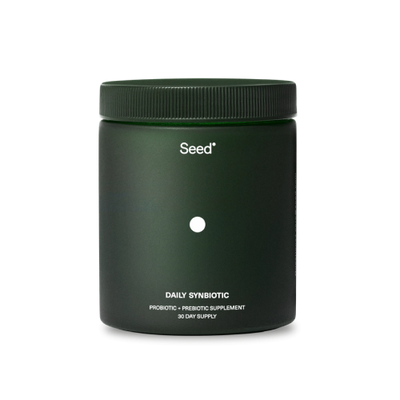
Our favorite thing about Seed is its commitment to pushing the science around gut health, the human microbiome, and probiotics/prebiotics forward.
- Efficacy
Seed's dedication to science is clear in all of their research, messaging, and team of probiotic experts on their scientific advisory board.
- Transparency
Seed links to all scientific studies it references in its marketing, which is rare in the wellness space.
- Accessibility
Seed is an expensive probiotictic at $50/month.
- Sustainability
Seed's commitment to sustainability is extremely apparent in their packaging, which utilizes glass containers and biodegradable boxes.
Seed is a master class in branding—their website is new-agey and slick, their packaging is renewable and their marketing content reads like a full-fledged course on biology. But while a lot of wellness products claim they are “backed by science,” Seed appears to...actually be backed by science.
Seed’s scientific advisory board is extensive—it includes doctors and researchers from Harvard and MIT, and is led by Dr. Gregor Reid, the scientist who discovered and defined probiotics. Pro tip: it’s always a good thing when a wellness company transparently shares the health advisors who back their products.
Seed’s one product, Daily Synbiotic by Seed, is a branded synbiotic, meaning a probiotic and prebiotic. According to gut health experts, the combination of a probiotic and a prebiotic basically means that a product can provide separate, unrelated health benefits (for example: digestive health and immunity). Some researchers also say that probiotics may face “survival difficulties” on their way to the gut, but by adding prebiotics into the mix to make synbiotic, they arrive in the gut safely.
Pros
Their packaging is very sustainable—the shipping box is made from ecological algae paper and your Daily Synbiotic will come in a recyclable, reusable glass jar.
The strains in Seed’s Daily Synbiotic have been clinically studied in heterogenous populations (meaning in both males and females) and are safe and effective for all sexes.
Two specific strains of Seed's Daily Synbiotic were examined in a 300 person study for their support of gastrointestinal functions, including bowel movement regularity, stool consistency, ease of expulsion, transit time and occasional bloating.
Cons
It’s hard to know if it works! The number one piece of feedback we’ve heard from contributors is that results aren’t “obvious.”
It’s an expensive habit at $50/month.
Seed's disclaimer with the Daily Synbiotic is that it is "not intended to diagnose, treat, cure or prevent any condition or disease," so keep that in mind as a consumer.
Tips
Seed told us that they recommend an informed conversation with a healthcare provider who may best advise on the management of any health concerns within the context of individual health history.
Do you need probiotics?
What are the benefits of Seed?
How often should you take it?
How does Seed compare to other probiotics or fermented foods?
How long should you take Seed for?
Is there anyone who shouldn't take Seed's Daily Synbiotic?
Contributor Notes
I haven't noticed a huge difference with using the product. But the company's communication strategy is what keeps me a loyal customer for over 1 year now. Their primary focus is on education and empowerment, shifting consumption of a single product to the consumption of information.
I definitely think seed had a positive impact on my digestive system. I didn't have a lot of digestive issues until I moved to a very different part of the country and suddenly felt like my system was completely off so I ordered seed. I have struggled with nausea and acid reflux in the past, I haven't noticed any impact on these issues yet - but do think it help rebalance my system overall. I often take seed with hot water with lemon and think that makes it work better.
While pro and prebiotic needs are different for individuals, for me personally, Seed has been a huge success. When I go a few days without it, I can tell. One of my favorite things about it is the eco-friendly packaging and shipping materials. I often avoid subscriptions due to all of the cardboard waste, but with Seed I feel a bit better.
- Efficacy
Seed's dedication to science is clear in all of their research, messaging, and team of probiotic experts on their scientific advisory board.
- Transparency
Seed links to all scientific studies it references in its marketing, which is rare in the wellness space.
- Accessibility
Seed is an expensive probiotictic at $50/month.
- Sustainability
Seed's commitment to sustainability is extremely apparent in their packaging, which utilizes glass containers and biodegradable boxes.